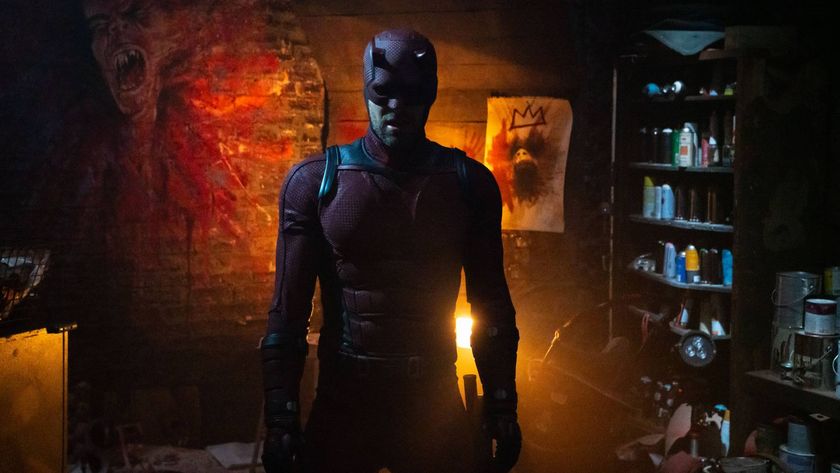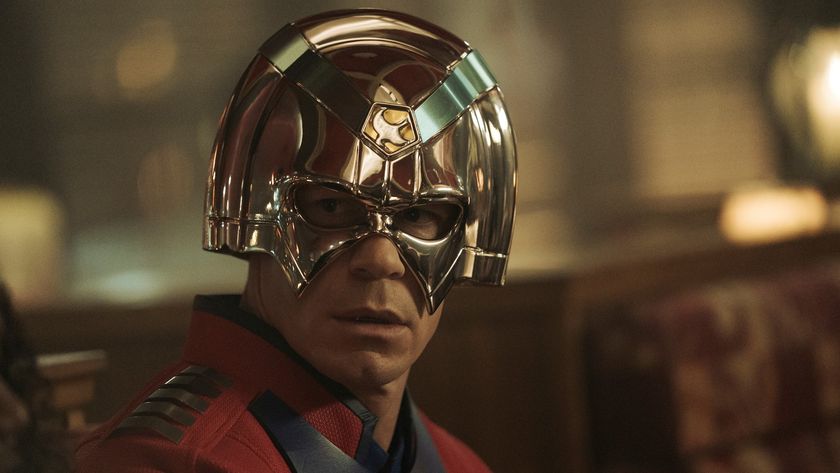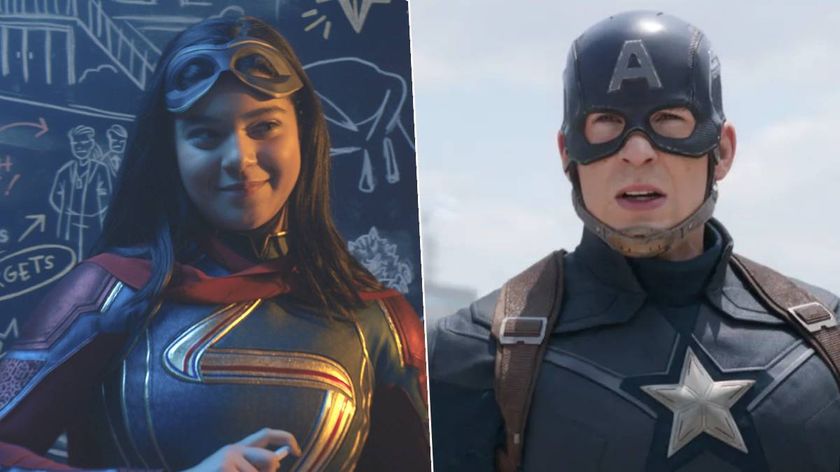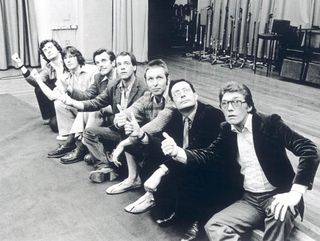
This isn’t the story of the whole Hitchhiker’s saga. It’s not the unedited 34-year legend that brings in a TV series, stage plays, five books, a computer game, bath towels, missed deadlines and lost chances. This is simply the story of that original radio serial, the cheap, misunderstood, written on-the-hop kickstart to this multi-million pound cultural gemstone. And it’s a story that begins…
…Once upon a time, well, in 1971, a young man named Douglas Adams was lying in a field in Innsbruck, Austria, pissed, skint and with a stolen Hitchhiker’s Guide To Europe in his rucksack. “Someday,” he thought as he gazed up into the night sky, “somebody really ought to write a Hitchhiker’s Guide To The Galaxy .” So goes the legend anyway…
He never really thought about it again until five years later when he was struggling to think of a convincing reason why an alien would ever visit Earth. Here, The Hitchhiker’s Guide To The Galaxy was born.
For a tale that has now become – if ever there was one – a mass market cult, Hitchhiker ’s origins were about as scatty and ramshackle as only a bunch of former public schoolboys could make it. It doesn’t even have the classic “first story” urgency about it. Hitchhiker ’s wasn’t a tale Douglas Adams had been fermenting all his life, it wasn’t the culmination of every half-finished thought or storyline he’d ever imagined; it was a one-step-at-a-time bluff that worked. It involves not only the central mad genius of Douglas Adams, but a supporting cast of talented carers and helpers. It’s the story of the first science fiction comedy. Ever.
Adams’s wild, tangential imagination had been utilised by Brett on The Burkiss Way and Week Ending but he was keen to develop something more substantial from the gangly 25 year-old Cambridge graduate. Brett, who described Adams as “a talent without a niche”, met with him at a Chinese restaurant near Broadcasting House in February 1977. Together they whittled down Adams’s myriad ideas to just one, a science fiction anthology comedy, with each episode climaxing with the Earth’s destruction.
Episode one of The Ends Of The Earth ended with the world being blown up to make way for a hyperspace bypass. Needing an alien to give the story perspective, Adams claims he remembered that idea from the field in Innsbruck. The more he ruminated on that concept, the more it seemed to naturally open up ideas for a continuing series.
The rough outline for episode one had as its main protagonist not Arthur Dent but someone called Aleric B. The three-page document has that name crossed out with “Arthur Dent” written above it. The outline ends with the bit where Ford tells Arthur the Earth’s entry reads “mostly harmless” and there are some scribbled suggestions for future episodes that bear no relation to what ended up on tape.
Sign up to the SFX Newsletter
Get sneak previews, exclusive competitions and details of special events each month!
A pilot was made, but Adams had a long wait to hear whether it was going to a series. Those who make those sorts of decisions were all on their Summer holidays and Adams, frustrated and brassic, sent the pilot script to the then-script editor of Doctor Who , Robert Holmes, in the hope of finally getting some work and dosh. On the last day of August word came down that a full set of six episodes had been commissioned, for which Adams was paid £180 per script (good news for a man who was sleeping on friends’ sofas and coping with an eyebrow-raising overdraft).
Simon Brett had received the go-ahead from the upper echelons of the BBC in June. While the suited relics at Radio Four were plainly bamboozled by Adams’s concept-heavy script they took the trusted Brett’s word for it that it was funny. Thus Hitchhiker ’s got the green light to go to a series. But there was one extra bit of news for Adams: Simon Brett, his most enthusiastic friend at the Beeb, was leaving the corporation for LWT.
Before he left, Brett suggested 25 year-old Geoffrey Perkins, then a junior entertainment producer, as his replacement. He was inexperienced and was nervy at undertaking such an aurally complex assignment, but after a lunch with Adams in which the writer admitted he didn’t really know what he was doing, Perkins relaxed into his job.
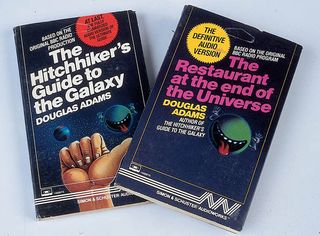
Those of Adams’s age at the time were the prog rock generation. Artists like Pink Floyd, Yes and Emerson, Lake & Palmer were coating their bloated masturbatory “concept” albums with a vast sonic landscape, taking their listeners on epic aural journeys. Adams’s ambition for Hitchhiker ’s was to wrench BBC Radio out of its drawing room confines and do something similarly pioneering with a radio programme.
“I had the idea of scenes of sound,” he said. “There would never be a moment at which the alien world would let up, that you would be in it for half an hour. I’m not saying we necessarily achieved that, but I think that what we achieved came about as a result of striving for that.”
Adams’s perpetual tinkering with the script and his propensity to improvise on set saw him thrown out of the director’s cubicle halfway through recording. His relationship with Perkins was sometimes fraught. Perkins’s methodical and ultimately more professional manner would occasionally clash with Adams’s more laissez-faire attitude. Perkins would find himself having to fight Adams’s reluctance to help with edit points for overrunning episodes and, being continually frustrated by Adams’s intransigence, he ended up going ahead without Adams (“I came across as the vandal of the programme,” Perkins said).
The first episode’s casting had been done by Adams and Simon Brett. That included Simon Jones as Arthur, Geoffrey McGivern as Ford Prefect and Peter Jones (no relation) as The Book.
Arthur Dent was written with Simon Jones, a Cambridge contemporary of Adams’s in mind. “He asked if I was interested in playing myself in a radio pilot he was doing,” Jones recalled. “What was interesting was to find out exactly what Douglas thought of me. I didn’t think I was the sort who went around wandering about trying to find a decent cup of tea.”
Adams meanwhile later maintained that Dent wasn’t based on Simon Jones, only to his strengths as an actor. “That’s a very different thing,” Adams said.
Peter Jones was cast after Adams was talking to Simon Brett about the narrator. “It should be someone with a Peter Jones-y voice,” he would say, before coming to the inevitable conclusion that maybe Peter Jones would be good at doing a Peter Jones-y type voice.
It was Perkins along with Adams who would cast for the rest of series. Marvin, Zaphod and Trillian didn’t appear in the pilot, so were cast after Brett’s departure. Mark Wing-Davey, coincidentally a friend of Peter Jones’s, was cast as the street-smart Zaphod while Susan Sheridan was cast as Trillian (after Adams had rejected the names Goophic and Smoodle).
“Douglas got stuck at the beginning of episode five, and was pretty stressed about it,” remembers Lloyd, who ended up writing one third of episode five and half of episode six. “He’d simply run out of ideas. The deal Douglas offered me was that if I help him out finishing the series then, if there was a second series we’d do it together.”
Lloyd at the time was halfway through a science fiction comedy novel called Gigax . He plundered its pages for ideas for the last episodes of Hitchhiker’s . The first episodes that Adams wrote alone took nearly ten months. The final two, which they worked on together in a converted garage in Knightsbridge, took only three weeks.
Work completed, the series finished recording on 3 March 1978 and the first episode went out five days later at 10.30pm on Radio Four. The BBC sprained few muscles promoting the series but, like most cults, word of mouth meant that more and more people were tuning in with each episode. Perkins remembers the moment he knew the series had hit a chord. “We really knew it was a hit when we got a letter which had just been addressed to ‘Megadodo Publications, Megadodo House, Ursa Minor”, and somebody had written in the corner, ‘Try BBC’. I thought that if the Post Office had heard of us, we must have made it.”
Steve O'Brien Visit Steve O'Brien's website, The Fan Can .
This feature was first published in issue 130 of SFX.
Read our 42 facts about The Hitchhiker's Guide To The Galaxy .
Read our review of the book Doctor Who: Shada .
Read our interview with Gareth Roberts about adapting "Shada".
SFX Magazine is the world's number one sci-fi, fantasy, and horror magazine published by Future PLC. Established in 1995, SFX Magazine prides itself on writing for its fans, welcoming geeks, collectors, and aficionados into its readership for over 25 years. Covering films, TV shows, books, comics, games, merch, and more, SFX Magazine is published every month. If you love it, chances are we do too and you'll find it in SFX.
Most Popular





